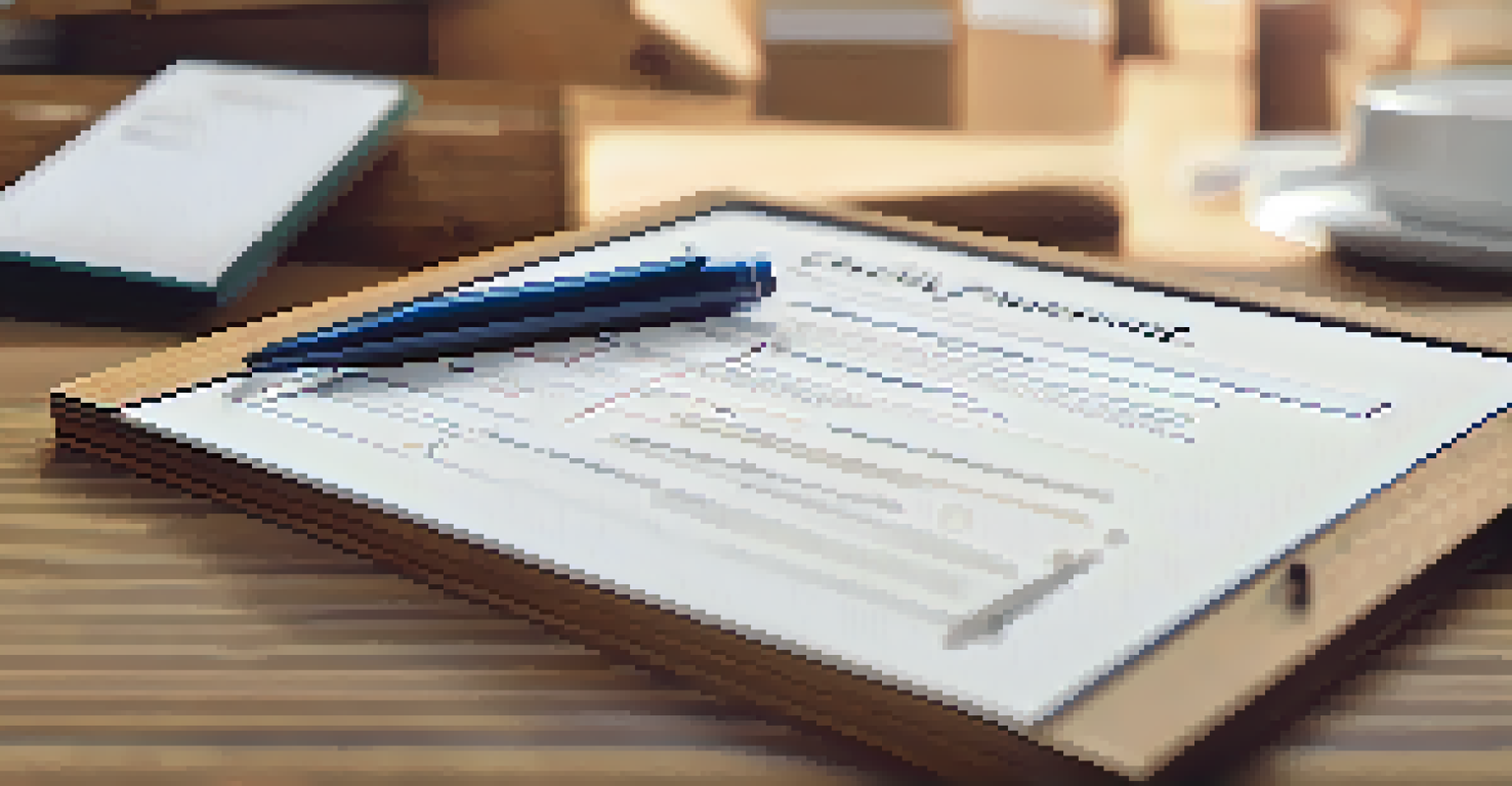How to Prepare for the End of a Lease Period

Understanding Your Lease Agreement and Terms
Before diving into preparations, take a close look at your lease agreement. This document outlines important details like your lease end date, renewal options, and any notice requirements. Knowing these terms can save you from unnecessary stress as the end of your lease approaches.
By failing to prepare, you are preparing to fail.
For instance, some leases require a 30-day notice if you plan to vacate, while others might have different stipulations. Understanding these nuances will help you avoid potential pitfalls, such as losing your security deposit. It's all about being proactive and informed.
Additionally, if you have any questions about your lease terms, don’t hesitate to reach out to your landlord or property manager. Clear communication can clarify your responsibilities and help ensure a smooth transition at the lease’s end.
Creating a Move-Out Timeline to Stay Organized
Once you’re familiar with your lease terms, it’s time to create a move-out timeline. This will help you break down the tasks you need to accomplish before the big day. Think of it as your roadmap to a stress-free move.

Start by marking important dates on your calendar, such as when to notify your landlord, when to schedule utility shut-off, and when to start packing. Spreading out these tasks over several weeks can prevent the last-minute rush that often leads to chaos.
Know Your Lease Terms
Understanding your lease agreement is crucial to avoid stress and ensure a smooth transition at the end of your tenancy.
As you create your timeline, consider adding buffer time for unexpected delays. After all, life is unpredictable! Having a well-structured plan will help keep your move organized and manageable.
Cleaning and Repairing Your Rental Property
One of the most crucial steps in preparing for the end of your lease is ensuring your rental is clean and in good condition. Many landlords expect the property to be returned in a state similar to when you moved in. This means a thorough cleaning and addressing any minor repairs.
The future belongs to those who prepare for it today.
For example, if you notice scuff marks on the walls or a leaky faucet, taking care of these issues can prevent deductions from your security deposit. It’s often helpful to create a checklist of tasks, like vacuuming carpets, wiping down surfaces, and fixing any damages.
Consider scheduling a professional cleaning service if you’re short on time or want to ensure a deep clean. This investment can pay off by helping you reclaim your full deposit and leave a positive impression as you move on.
Documenting the Condition of the Property
Before you hand over the keys, it’s wise to document the condition of the property. This can serve as evidence that you left the rental in good shape, safeguarding your security deposit. Take clear photos of each room, focusing on any areas that might be questioned later.
For instance, capturing images of walls, floors, and fixtures can provide a solid reference point. A video walkthrough can be even more effective, giving a comprehensive view of the property’s condition. Make sure to date these documents for future reference.
Prepare a Move-Out Timeline
Creating a detailed move-out timeline helps you stay organized and manage tasks efficiently before your moving day.
Additionally, if you notice any existing damage that you didn’t cause, inform your landlord in writing. This proactive approach can help avoid disputes and ensure you’re not held responsible for issues that predate your tenancy.
Notifying Utilities and Service Providers
As your lease period comes to a close, don’t forget to notify utility companies and service providers of your upcoming move. This includes electricity, water, gas, internet, and any other services you may have. Giving them advance notice helps ensure a smooth transition both for you and the next tenant.
Typically, utility companies require a few days’ notice for service termination or transfer, so plan accordingly. You don’t want to be left without essential services on your moving day. It’s a good idea to schedule the final readings for your utilities a day or two before you vacate.
Moreover, consider setting up a change of address with the postal service. This will ensure that your mail is forwarded to your new home, preventing any important letters from getting lost in the shuffle.
Organizing Your Moving Logistics
Now that you’ve tackled the cleaning and documentation, it’s time to focus on the logistics of your move. Whether you’re hiring movers or doing it yourself, having a clear plan is essential. Start by deciding what items you want to take with you and what you might need to sell or donate.
Creating an inventory list can help you keep track of all your belongings during the move. You could even categorize items by room or priority, which can make unpacking at your new place much easier. And don’t forget to gather packing supplies early to avoid last-minute runs to the store.
Document Property Condition
Documenting the condition of your rental property can protect your security deposit and prevent disputes with your landlord.
If you’re using a moving company, reach out to them well in advance to book your moving date and discuss any specific requirements. Proper planning can minimize stress and ensure that moving day goes as smoothly as possible.
Final Walkthrough with Your Landlord
The last step in preparing for the end of your lease is to schedule a final walkthrough with your landlord. This meeting gives you both a chance to review the property's condition and address any concerns. It’s an essential step to ensure that both parties are on the same page regarding the state of the rental.
During the walkthrough, be ready to discuss any damages or repairs you’ve made, as well as any pre-existing issues you documented. This can help prevent misunderstandings and ensure a smooth return of your security deposit. It’s also an excellent opportunity to ask about the timeline for deposit returns.

Keep the conversation friendly and professional, as maintaining a positive relationship with your landlord can be beneficial for any future rental references. A little preparation can go a long way in making this final interaction successful.